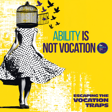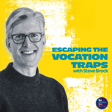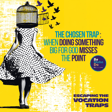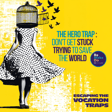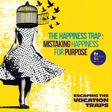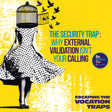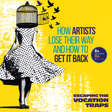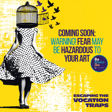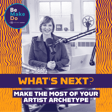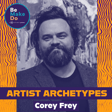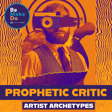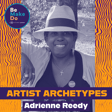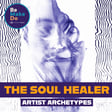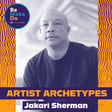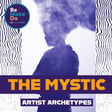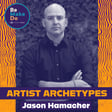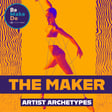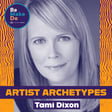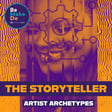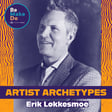Introduction to Wise Heart at One and Study Guide
00:00:00
Speaker
Hey Lisa. Hey Dan. This Wise Heart at One series is awesome. It is. Having such a good time with it. I want to spend a little bit more time with it. Maybe we should create something. That's a great idea. Maybe something like a study guide. A study guide? Yes. That sounds awesome. Where would I get that at? Well, actually, if you go over to soulmakers dot.org backslash BMakeDo, you can download a free Wise Hearted One study guide right now. It's got lots of great questions, some word studies and a little bit of commentary for you and maybe a group of people to go through together.
00:00:37
Speaker
That's awesome. That's what I'm going to do right now. What are you going to do? I'm going to go to soul makers dot org backslash be make do and download your free study guide.
Overview of Be Make Do Podcast
00:00:59
Speaker
Hello, welcome to the Be Make Do podcast where we explore what it takes to live out your call in the arts with spiritual wholeness and creative freedom. I'm your host, Lisa Smith, here with my producer, Dan ABH. Hello, everyone. and As always, it's our passion to encourage you to become who you are created to be, make what you are created to make, and do what you are created to do. So I'm going to introduce our special guest in just a second, but I want to tell you that this summer, what we're doing is exploring some of the questions that came out of this wise-hearted series that we've been playing with. That's all about the artist's call of Bezalel in Exodus, and um and it links to the discussion guide that is available on our website, soulmakers dot.org, if you'd like to go deeper with some of those questions.
Challenges Faced by Christian Artists
00:01:46
Speaker
But that's what we're going to do.
00:01:48
Speaker
We're going to dive right on into some of these heavy questions about what we're allowed to make as Christians in the arts. And I know from conversations over time, not everybody struggles with these things, but I know that it is something that is prevalent with a lot of people. And if it is something that you struggle with, it can be paralyzing. Really. And this links back to our ah conversation in the episode, Idols and Altars in the Wise Hearted One series, which you can listen to on our podcast channel on our website or on our website.
00:02:27
Speaker
So for this series, we thought it would be good for us to just go ahead and have some good old conversation around these questions and give our perspectives as well as bring in some people we know have really spent time addressing the issues because we believe we can really get to the root of this. and get some confidence and some clarity so that we can have that kind of freedom. So in the conversation, I've got producer Dan here with me. um and And in addition to producing the podcast, I just want to kind of introduce him as an artist as well. He is an accomplished musician and plays in two award-winning bands as well as many other kinds of
00:03:06
Speaker
ah artistic and musical projects, as well as being a developer of community and a mentor to young musicians. So he's very much in the world of music and art in the and the East Coast scene, I suppose.
Interview with Karen Swenholt: Artistic Freedom
00:03:23
Speaker
And then we have our special guest today with us is Karen Swenholt. So hi, Karen, you finally get to say hi. Hi. Hello. Hello. Thank you for joining us. Thank you for inviting me. Of course. Karen is a figurative sculptor who lives in works in Northern Virginia. And Karen is actually an artist, or the artist in residence at Convergence, which we mentioned Convergence.
00:03:48
Speaker
sometimes on the podcast. I don't think we've ever really gone into what it is, but it's a community of faith that Soul Makers and the be Make Do podcast was really born out of a group of Christians and contemplatives in the area. So Karen has been artist in residence at Convergence. ah where she for a long time had very large scale, incredible sculptures outside on our lawn. We've since moved things inside, but she also has her studio here. She served as artist in residence at the Washington Shakespeare Company at Wesley Theological Seminary. So her work can be found in lots of different places in public and private collections, including the home of Bono of U2.
00:04:31
Speaker
and is in the permanent collection of the Vladimir Romanov Palace in St. Petersburg, Russia, um all kinds of different places around around the country and the world. And we'll put a link to her website in the show notes so that you can see more of Karen's work and learn more about her. um But in in addition to all of that, ah She is a very good friend and I think a prophetic person as well as an incredible artist. We've had this conversation about the freedom of the artist and the importance of it so many times. She's been a mentor to me and really helped me shape my thinking around this. So I thought, and actually I think Dan, you're the one that said, we've got to get Karen in to talk about this because she has such um wisdom, I think, in this area. Not to puff you up too much, Karen, no pressure, but
00:05:24
Speaker
Yeah, we're big fans of you, Karen. Yeah, we love you. But this this theme of freeing the artist is something that we learned from you. And we've even made it a ah hashtag that we sometimes use, hashtag free the artist, um because it's so, so important. Yeah. So I want to outline this conversation just a little bit. um And then we'll we're just gonna kind of dive in and um Karen can share some thoughts on on the subject and maybe how we can get free of the things that sort of hold us back. And we were talking about the the title and focus on the conversation. I had sort of said like, what are we allowed to make as Christians? And Karen is talking about getting free from condemnation. And and that I think is a much more pinpoint
00:06:18
Speaker
um description of what we're talking about. And this goes to all different ah disciplines and categories of art making. So i I know I for first encountered this as an actor when I was in high school, just around like, am I allowed to say bad words? or even there was a line I was supposed to say, which was, Oh my God. And my mom made it very clear that I was not going to say that it needed to be changed. Oh my gosh. But I had to go to the director and we had to have that conversation. um And so very, very quickly, there was this like,
00:06:53
Speaker
there are lines that I can't cross. I'm not sure which which lines are they. And when it bumps up against the artistic lines from the other direction, it started to cause me anxiety. And then after I graduated from school and I moved to l LA, then there's all these questions about nudity and subject matter and again language. like it It caused so much anxiety for me that it really actually did become an impediment for me in pursuing an acting career in a in Hollywood because it was more than I knew how to navigate at that time.
00:07:28
Speaker
And I know that that translates into a lot of different art-making arenas. And I know we've talked here and specifically about visual artists as well. So that's, I mean, that's where we are. Are there things, are there limitations to what we can make and not make as Christians? um You know, actually, I just, I wanted to point this out too, because you always get on me, Dan, that I don't talk about music enough. But like even in the church world over the last 20 years, there was a progression of like you cannot use specific instruments. In some churches, it's still like you can't like using guitars is wrong or using drums is wrong or certain lyrics. There are all of these kinds of um
00:08:16
Speaker
hang ups or limitations that can be imposed. So but
Overcoming Condemnation in Artistic Expression
00:08:22
Speaker
let's let's talk about that. what What are these limitations within these religious circles around art making and why is that problematic? Or is it a good thing? Should we should we be more concerned with those those challenges? What do you think? Karen, what do you think? If you're asking me, I will tell you. ah little I guess i it's like a little analogy that occurred to me before you even asked me to do this. And it's kind of crucial to the um
00:08:54
Speaker
discussions, this silly picture. But it's a picture of a pasture. Two different people, a secular artist and a Christian artist, are both to design a dance. So they both have these beautiful fields dotted with wildflowers. But the difference between the secular artists' field, rehearsal field, and the Christians' is the christians' field is filled with cowpies. And cowpies are large um large piles of excrement that can be like 12 to 14 inches wide.
00:09:34
Speaker
and And you can see them like across the field. like I lived on a farm for a little while and I i experienced these cowboys in the field. And you don't always see them because grass starts to grow through them. So you have to be very vigilant. you just They're not all apparent to like a scan. So we've got the Christian artist in the cow pie field doing their rehearsals and we've got the secular artist in the daisy field. Who is going to do the better dance? There is no question. The one that does not have to be vigilant. The one that doesn't have to worry about stepping in it.
00:10:17
Speaker
What are the cow pies in all of these different fields? This is the dancers. What do I wear when I dance for a dancer? We can go on forever. What instrument am I allowed to play? um For me as an artist, can I do people? Can I do art that God doesn't initiate? Or art that my church never requested and never entered their mind? and never will unless I introduce it. um Can I do secular work? Can I perform a dance about Apollo chasing Daphne because that's a Greek god? right So we have all these ways that the Christian, their heart condemns them with this confusion, but it's not
00:11:12
Speaker
God that puts these questions and doubts in our mind.
00:11:21
Speaker
Because there's no condemnation in Christ Jesus, what puts the these things in our minds, it's the culture of the church. And we cannot confuse the culture of the church with the Bible. We cannot confuse the culture of the church with God himself. because he's kinder, he's more merciful, he is love, and we are not. And he says that when you're free in Christ, you're free indeed. So we are free to express ourselves in real life, but each person who goes to their studio and has a doubt about
00:12:10
Speaker
Am I allowed to do this? Am I allowed to do that? is Is this, oh my, can I? When your studio is filled with cow pies, you're not going to be able to invite God into it. And right now, the secular artists are acing us out. But with God, we should be and can be doing the best work out there. Because we have this extraterrestrial ah connection. We have something bigger than man.
00:12:41
Speaker
wiser than man, infinitely creative. The guy who makes the zebra and the giraffe and the rhino, we got that guy cooking with us in the studio if our condemnation has been dealt with. So how do we deal with the condemnation? Yeah. Okay. So we're going to go to the how, but I i just want to kind of explore that a little bit too, because somebody might say then, well, but the the caution or the, um what was the word that you used? That um ah the the the doubt or the self-examination is a good thing, you know, like in a religious context, like to be aware of, is this
00:13:28
Speaker
inside the will of God or not, you know those those kinds of things. And and you're talking about not having to worry about those cow pies. But what you're not you're not saying like, Don't care. It doesn't matter. you you know Just like follow your own. in like that in order to be able What we're kind of advocating for is a really deep ah discipleship of the artist as person.
00:14:01
Speaker
that then you're able to be free to follow those impulses and instincts because it's within this deeply rooted faith. and it's not The difference is and the importance is that it's I think what I hear you saying is it's not really possible to create art. like This is extremely problematic for an artist when there are all these landmines around of be careful, be careful, be careful, be careful, because it's not possible to create much great artwork with those limitations. like It just doesn't work that way. So we have to find a way to be faithful and secure in our faithfulness as Christians.
00:14:46
Speaker
without being constantly afraid we're going to step in it, as you said. Right? Is that right? Right. i um I don't think our problem is with God. I think our problem is with um the enemy of our soul. I think our problem is with condemnation. Because once that condemnation comes in, there's a wall that strips jumps up between us and God. so we have to So in my opinion, I'm saying we have to, that's an awful thing to say. um in my but but I'll tell you what I did. How's that? um I'll tell you a little story.
00:15:24
Speaker
um I knew a brilliant artist who did extremely original challenging work. He graduated from VCU and his teacher who was a Christian told him he needed to go to a theological seminary. I met him at Wesley. He was very confused. was very He even began to doubt his own faith and he is now a dental assistant. The teacher thought he was too powerful, and he needed to have know everything before he started doing art, because he didn't want him like preaching from that podium of his art. He didn't want him preaching something that was wrong. I just did a piece
00:16:13
Speaker
I'm embarrassed to say predicated on a complete misunderstanding of an aspect of the scripture, but that misunderstanding powered the love and the peace. So, the piece was much stronger from my confusion, and God corrected me, but that like poetry I pulled out of the Bible to fuel my emotion to make the piece communicate. God works all things for good for those who love God and are called according to His purposes.
00:16:47
Speaker
So I'm going off on a little bit of a tangent, so I'm telling you about this guy in VCU who becomes the dentist. You two were told by their pastors to put down their instruments, and if God wanted them to do it, they' they'd be called back to it. They would be given back to them. They just stopped going to that church, as far as I understand, and they kept doing their music. um And I had my little experience with this kind of thing. I had a friend who it was in a more southern part of Virginia. She wore a little doily on her head. She had never worn pants, I don't think, in her life. um She was like a mother figure to me, regardless of her
00:17:32
Speaker
she She really knew that knew God and loved him, but she came out of a culture, a Christian culture. And when she found out that I did nudes, she told me to burn them. wow And now, how many people live, well, this is people my age, threw away their record collections when they got came to God. Dan's having a heart attack over here. Right. There's this culture, but what we have to do before we throw away our record collection, before we burn our paintings, we need to go to
Biblical Nudity and Artistic Exploration
00:18:10
Speaker
God ourselves. I suggest that we coming from our world
00:18:17
Speaker
coming from maybe our bigger world. I mean, I already had an art education when I was told to destroy these pieces. So it wasn't easy for me to go and burn them. My stakes were much higher than Joyce's. Joyce just looked into her little bag of of Christianity and pulled out the first answer. and gave it to me, not because she didn't love me, but because it's what she knew. You cannot be vigilant, you cannot be careful enough of the cultural Christianity. The culture changes. The goods and the bads, the yes and the nos, they change, generation to generation. So we need to go back to the word.
00:19:03
Speaker
Karen, could you give us an example of like how you did that for yourself? like How you went into the Bible to figure out how to get over being vigilant in your artwork? On this issue of nudity, okay, here it is. um How does God use nudity? What does God do with nudity? Because when you're writing, you're making word pictures in people's minds. So when he has Adam and Eve naked in the garden, there are two nude people in my mind. I'm a little girl and I'm reading about Adam and Eve in the garden. Oh my word. And it was disturbing to me because nudity is dirty, but yet what is God illustrating?
00:19:54
Speaker
like He's talking about their innocence. Their nudity is their innocence. So I i i pondered that. it It was one of the first like mysteries I kind of thought about that had to do with God, like, how is that innocent? So the first example he uses of nudity, the first time you crack the thing open, the I'm sorry, the Bible open, at the beginning, you you run into Adam and Eve. um
00:20:25
Speaker
They were actually in more, they were less innocent clothed than they were naked. Okay, so here's a picture that he makes, puts it in our mind. We even see in a man and ah man and a woman together, which verges on pornography in the wider culture, in the Christian culture. We have a man and a woman naked together? Right. But God uses it. What's the difference? There isn't like lust underguarding it. There's an allegory of unfaithful of Jerusalem. And in this allegory, he paints a word picture of a treasured mature female beauty. When he paints this picture, you will see it. It's really shocking.
00:21:14
Speaker
Then I passed by and saw you kicking about in your blood. And as you lay there in your blood, I said to you, live, I made you grow like a plant of the field. You grew up and developed and became the most beautiful of jewels, which we all are. Your breasts were formed and your hair grew. You who were naked and bare. Later I passed by, and when I looked at you and saw that you were old enough for love, I spread the corner of my garment over you and covered your nakedness. I gave you my solemn oath and entered into a covenant with you, declares the sovereign Lord, and you became mine.
00:21:57
Speaker
In our mind's eye, we can't help but see really a child, a naked girl child, but she's like a jewel. She's treasured. She's honored. She's loved. Our attention is even drawn to our breasts. And you might say that God covers her in the narrative. you know He takes the garment and covers her, but he reveals her in graphic detail first. So God didn't have to talk about Jerusalem like this, but he did. If he can do it, I can do it. I know that sounds a little arrogant, but you look in the Bible to see the precedent.
00:22:46
Speaker
How does God handle the subject? The last one, it's a picture of nakedness as an expression of shame. Therefore, I'm gonna gather all your lovers with whom you found pleasure, those you loved as well as those you hated. I will gather them against you from all over from all around and will strip you in front of them and they will see your nakedness. That's a really graphic image. It doesn't feel sexual again, because the spirit of lust isn't behind it. This is the level, my precedent, my God uses this imagery to make a point.
Art as Evidence of God's Existence
00:23:25
Speaker
yeah Do you understand the freedom we have? I mean, that blows my mind. And when you take all the little Christian culture yes and no's out of it, the power we have of expression, we partnered with,
00:23:43
Speaker
a communicative, living God through the Holy Spirit, we should be blowing the world away right now. Instead, we're dancing between the cowpies and being brought up short. like really you were Lisa. And so we can, this is just one example of one little area that I looked at. Everybody has, every discipline has its areas where they have to ah work it out. Every soul so has their area to work out. If I had some kind of trauma about nudity, it may not be,
00:24:30
Speaker
God may have moved me into still lives, you know? But um it it it it's about us as individuals. We're precious jewels. We're individual. God's light shines through us. and Why is this important? Why is it important we be free? I think it's important we be free because the fingerprint, the face, the individuality, we're individual, completely unique stones, living stones, jewels through which he lights. Now, when we make our art,
00:25:12
Speaker
We are leaving evidence in our time of a living God because we're not doing it alone if we have a condemnation free studio space.
00:25:28
Speaker
And he can speak to us and we can speak back. We can dialogue with him through our art form because it is a language. Whatever art form you have, you know, it's a language. so So we leave this evidence of God's existence through the thoughts we have that a person who doesn't know Him would never, it would never enter their mind. yeah And we get to breathe, we're part of God breathing into our culture, His goodness, His truth, His personality.
00:26:05
Speaker
his His beauty. So I think the individual is more important than we think. And that individual story, three but an individual, free to express who I am with God's light shining through, we are precious by definition. yeah
00:26:26
Speaker
i I could listen to you just talk about these kinds of things all day. And it ah it always harkens back to a conversation we had out in Leesburg in a huge field up on a hill and just you know just this vision. this It was very expanding for me to think about art making in this way. And I think some of the and this idea of our our work to be leaving evidence is also really freeing to me. I think that's such a helpful category because that can look so many different ways and it doesn't have to be a complete picture of anything. It's it's it's a clue. It's a scent. It's ah an image. It's a you know a feeling. it's you know they're all ah
00:27:13
Speaker
it It's evidence, like you said, of something larger, which I think is really helpful because going back to what you were talking about earlier, um about the student at Wesley who who they didn't want him to be preaching a false narrative through his work. But what we do as artists is not preaching. And I think that's part of the confusion is our work is to leave evidence and God puts the whole thing together in ah in a person's life. But we're we're not that's not necessarily what we're tasked with as a rule, what artists are tasked with.
00:27:56
Speaker
And so just like you said, kind of going down the wrong path actually led you to something bigger and beautiful, more beautiful with a piece of artwork. Like again, we don't have to be vigilant. We don't have to be afraid because we're just, we're we are consciously making ourselves conduits for God to work through us to leave evidence, as you said. it's It is much more freeing, and i i it sounds clear, but I think it is something that you have to individually take time, like you said, to really work it out for yourself. like It's not
00:28:36
Speaker
I don't think it's okay as a Christian in the arts to leave these things unresolved. I i do think it's a should. You have to work these things out. um It's not good enough to say, oh, i I don't know what I think or how I feel about this. I don't know what God's like. The answers are there. So it's it's worth it to get to the bottom of it so that you can not have to be vigilant. any anything like this unexamined can stop you in your tracks. And i and condemnation isn't just um unpleasant.
00:29:21
Speaker
Condemnation builds walls between us and God and as artists and as human beings. So our art becomes a wall between us and God. So I have this thing about know, like every know that you say to yourself or every know that you listen to and every like you shouldn't is limiting what you can do. You know, God doesn't want you to limit what you can do in your art and craft. I i just don't believe that. I hear these stories, you know, from a lot of people that grew up in the church. And I'm sort of spoiled here with you guys um because I never went through that. But the stories I hear about how the church and other organizations have told people what type and kind of art that you can and can't make is just so ridiculous to me. And I just don't believe in these restrictions of the gift that God has given you to be restricted. So there's no way, it's just my opinion, there's no way that God wants you to limit what you can do. Because if you limit what you can do, especially in your art, then you can't make this evidence that Karen, that that you're talking about. And if you do make art with these restrictions, then I just believe that it's not good.
00:30:40
Speaker
yeah God permits vision into the fantastic. I looked, I saw a windstorm coming out of the north, an immense cloud with flashing lightning and surrounded by brilliant light. The center of the fire looked like glowing metal, and in the fire was what looked like four living creatures, etc. Surrealism. fine with God, take it all the way out there. He takes it all the way out, and he's poetic in his self-description. This um flashing, lightening, and dark clouds, I think it's in Psalm 80 or 81, this image of God coming to, no, 90. It might be 80.
00:31:27
Speaker
But anyway, he's coming to rescue this person, and he says, whose thought of God as surrounded by darkness? this light surrounded by darkness. and But God is giving us this imagery. He's taking us everywhere. um God anoints the mundane for understanding. Jeremiah 18 at the potter's house. then the So he's watching this potter. I went down to the potter's house. I saw him work in the wheel.
00:31:59
Speaker
um The pot was marred by his hands, so the potter crushes it and forms it into another pot, shaping it as seen best in him. The Lord says, oh house of israel can i not do it with you as this potter does, declares the Lord." Tough, tough stuff. So as we're working even in a still life, or we're seeing beauty, I call it call and response, like we see a beautiful landscape and we sing it back to Him.
00:32:36
Speaker
either literally with music or with like a painting. That is also all of it, all of it, all of it. All of it, however God's made you, however your gift moves you. Do your research, find your freedoms, and clear your pasture land.
00:33:00
Speaker
So you can dance every way the Lord leads you. Cause I'll tell you one other thing that I found out doing art that we're taught in schools to have logical linear thinking. But the first thing you learn in art is you're painting the whole canvas at the same time. You're working the whole piece at the same time. You're pulling from everywhere. And you can't do that if you've got all these walls up, all these rooms you can't go in. You can't pull from everywhere. There might be something behind a wall that's two walls away that you need for this piece that the Lord wants you to have for this piece, but you've fallen into your cultural Christian habits and you can't get there. We're responsible.
00:33:49
Speaker
And as much freedom as we... and And I'm not saying we don't listen to him. I'm saying we make it very important to listen to him. Yeah.
Full Artistic Freedom in a Christian Context
00:34:06
Speaker
Yeah, I think what has kind of clarified for me in in listening to you talk too is this, we're talking about freedom. It's not about rearranging theological furniture. you know We're not talking about that at all.
00:34:25
Speaker
What we're talking about is the full freedom to explore that, yeah get inside of it, taste it, see the colors, try to understand it from an infinite amount of possibilities. And and all the examples you've shown show that, that crystal clearly to me, like God is not afraid to pull out some crazy imagery or some really challenging imagery or really violent imagery or really you know all of those things God is using because they connect with something in us to get a point across, to invite us to something, to get us to touch reality, to confuse us so that we're not so complacent anymore. And so
00:35:20
Speaker
like you've talked about that freedom that as Christians, we have full access to any and all images to use within the service of this Christian worldview. it's not We're met not messing with the core at all, but it's you know we have to see, even even if maybe some people like the lady in the pew or maybe the person in the pulpit doesn't understand or isn't comfortable with that playing, We have to get comfortable with understanding what we're doing. And like you said, the responsibility that we have as artists to do it, because there are things that we need and that our culture needs that if we don't, the evidence is not there. It just isn't.
00:36:13
Speaker
there There's a scripture, all that is good, all this lovely, all that is true, something I'm paraphrasing, think on these things. But these examples I gave you, especially the one of the women where shame nudity is used to um illustrate shame, God is telling us that story. Right. so
00:36:42
Speaker
That's the scripture, but it has to be read in context of the whole book. right These answers are there for us and we we need to find them and and and be free. He really, really wants us to be free. We'll have so much fun. yeah
00:37:12
Speaker
I think this is a great this is such a great conversation and i I really do hope, and I know it's your prayer too, that for people listening that it will touch in the right places to unlock that and give permission to to figure it out and get free and understand how important it is that we do. And I just i think this is such a... um Such an important and also helpful and practical way to think about it um that we really really need to be to be sharing so i'm really grateful for you taking your time karen to share with us on the podcast and i'm excited to be able to share with our audience um because we we just have we all have such a heart.
00:37:55
Speaker
for freeing the artist. that's That's where it came from is these conversations with you of free the artist. So thank you so much, Karen, for talking with us today. We really appreciate it. Thank you. I really appreciate the opportunity because this is like in me and it's got to come out. Well, thank you so much. There's so much rich stuff. in this to really take away and and chew on. And I'm sure we'll have other conversations and hopefully have conversations with ah people in our audience as well. I mean, we'd love to hear from you too. If you have questions or thoughts on this, um definitely send us an email or post something on our Instagram, social media. We'd love to keep this conversation going and um and hear if there are other questions that we can address together too. Right, Dan? Right. Of course. We'll see you guys next time.
00:38:44
Speaker
Thanks for listening to Be Make Do, a Soul Makers podcast. If you want to go deeper, be sure to visit soulmakers dot.org and download our free Wise Heart at One study guide with questions for personal reflection or discussion with the group, plus word studies and more.

